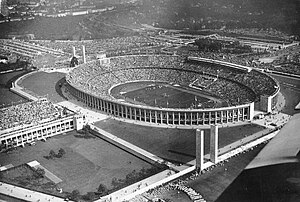1936 Summer Olympics / Athletics - 50 km walk (men)
|
|
|||||||||

|
|||||||||
| sport | athletics | ||||||||
| discipline | 50 km walk | ||||||||
| gender | Men | ||||||||
| Attendees | 33 athletes from 16 countries | ||||||||
| Competition location |
Olympiastadion Berlin (start and finish) |
||||||||
| Competition phase | August 5, 1936 | ||||||||
| Winning time | 4:30: 41.4 h |
||||||||
|
|||||||||
|
|||||||||
The men's 50 km walk at the 1936 Olympic Games in Berlin was held on August 5, 1936 in the Berlin Olympic Stadium. 33 athletes took part, 26 of whom made it to the finish.
The Olympic champion was Harold Whitlock from Britain, ahead of Arthur Tell Schwab from Switzerland . Bronze went to Adalbert's Bubenko from Latvia.
Existing records
- World best time: 4:26:41 h - Edgar Bruun ( Norway ), Oslo , June 28, 1936 - World records are not set in street walking because of the different track conditions.
- Olympic record : 4:50:10 h - Tommy Green ( Great Britain ), Los Angeles , August 3, 1932
Routing
The starting point was in the Olympic Stadium . After almost one round of the stadium on the cinder track, the route led through the marathon gate out of the stadium into the city of Berlin . After crossing the Maifeld , the path turned right into Angerburger Allee. Shortly afterwards it went left into the Glockenturmstrasse and to the first checkpoint after four kilometers on the Havelchaussee . The route continued along the banks of the Havel , the Grunewald on the left. The second checkpoint was at six kilometers on the Rupenhorn , two kilometers further on was the third checkpoint on the Schildhorn . The Grunewald Tower was reached after ten kilometers, at the level of Lindwerder Island , the course led the walkers towards the southeast. At the end of the Havelchaussee it went left on the AVUS . The route continued over the racetrack almost to the Nordschleife. Shortly before this loop and the exhibition grounds, the route made a curve to the left onto Waldschulallee, then left again onto Teufelsseechaussee . Now the Drachenberg was passed and shortly before the Teufelssee the route followed the Alte Potsdamer Chaussee (today connection street). At the end of the Chaussee it went left into the Teltower Weg. There was the turning point after a few meters. The way back through the marathon gate to the Olympic Stadium was on the same route. The finish line was reached after the last 150 meters on the cinder track.
The race
August 5, 1936, 1:30 p.m.
Weather conditions: overcast, 17-18 ° C
A short shower two hours before the start left large parts of the route in the haze. After the start the Swede Evald Segerström took the lead, but was soon replaced by the German Friedrich Prehn. Both of them and the Czechoslovak Jaroslav Štork controlled the race up to ten kilometers. Then Segerström took over the lead again and Prehn fell back. After a good 17 km, Štork moved forward, followed by Latvian Dali ,š, who in turn took the lead at 25 km. Here the Briton Harold Whitlock showed himself for the first time, lying in third position. After 32 kilometers he took the initiative, Daliņš gave up the race a short time later. The Swiss Arthur Tell Schwab now worked his way forward. He fought with Štork and the Latvian Adalberts Bubenko for the other medal places behind Whitlock, who finished the race undisputed as the winner. Schwab crossed the finish line a minute and a half behind him. The Latvian Bubenko won the battle for bronze. In the last ten kilometers he was able to convert a gap of half a minute on Štork into a lead of over a minute.
Harold Whitlock undercut the Olympic record by more than 19 minutes and only missed the world record by about four minutes.
Arthur Tell Schwab and Adalbert Bubenko won the first Olympic medals in walking competitions for their countries.
literature
- Ekkehard zur Megede , The History of Olympic Athletics, Volume 1: 1896-1936, Verlag Bartels & Wernitz KG, Berlin, 2nd edition 1970, p. 280f
Web links
- SportsReference 50km Walk , accessed September 21, 2017
- Official report pp. 68–684, engl. (PDF), accessed on September 21, 2017
Individual evidence
- ↑ World record development of 50 km walking on rekorde-im-sport.de , accessed on September 21, 2017
- ^ Official report p. 684, engl. (PDF)
- ^ Official report p. 683, engl. (PDF)
- ↑ Official report p. 606, engl. (PDF)